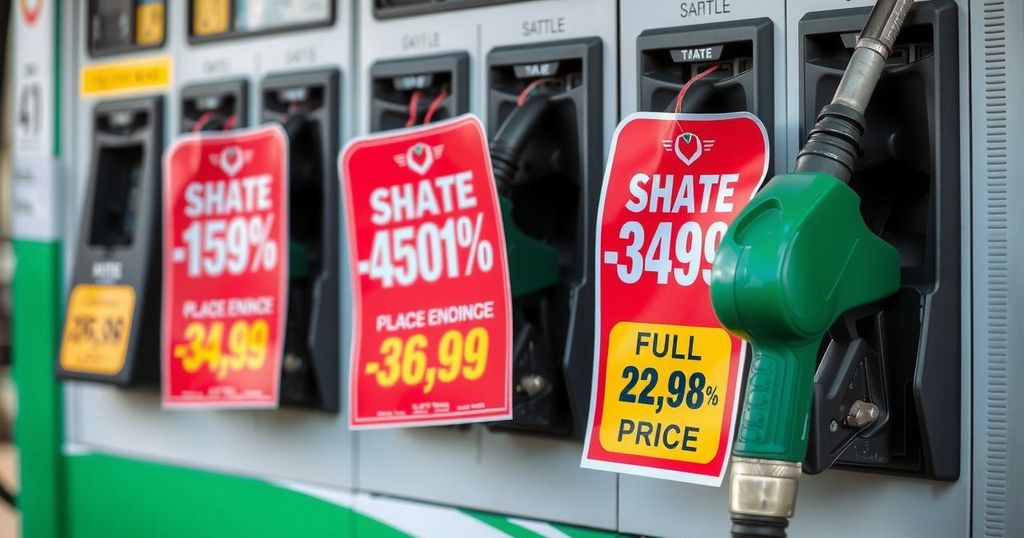EPRA Announces Fuel Price Reductions to Alleviate Holiday Financial Burden in Kenya
The Energy and Petroleum Regulatory Authority has reduced fuel prices in Kenya, with petrol down by Sh4.37 to Sh176.29, diesel down by Sh3 to Sh165.06, and kerosene similarly reduced. This marks the lowest prices since April of the previous year and is influenced by a drop in global petrol prices and a stable Kenyan Shilling. However, there are concerns about rising transport fares amidst the festive travel season, highlighting the need for fair pricing practices across the market.
The Energy and Petroleum Regulatory Authority (EPRA) has recently announced significant reductions in fuel prices, providing relief to Kenyans ahead of the festive season. Effective immediately, petrol prices have decreased by Sh4.37 per litre to a new total of Sh176.29. Diesel prices have dropped by Sh3 per litre, now at Sh165.06, while kerosene also sees a Sh3 reduction, bringing its price to Sh148.39. These changes reflect the lowest retail prices observed since April of the prior year, stemming from a minor dip in international petrol costs and a stabilization of the Kenyan Shilling against the US dollar.
Notably, despite the welcomed drop in fuel prices for motorists, commuters may experience increased fares as public service vehicle (PSV) operators often seize peak travel opportunities to raise prices. Reports indicate a rise in transport fares, particularly for routes from urban centers like Nairobi to rural areas. This situation has led to calls from various stakeholders for manufacturers and transporters to pass on the fuel cost savings to consumers.
Consumer Advocate Stephen Mutoro highlighted the discrepancy in pricing practices, stating, “Companies rapidly adjust prices upward in response to increased operational costs but are slower to do so when costs diminish.” The recent decline in fuel prices, which has seen petrol decrease by over Sh40 per litre since October of the previous year, can be attributed to a combination of reduced crude oil prices, a stronger Kenyan Shilling, and governmental subsidies associated with the petroleum development levy. The Kenyan Shilling remains stable at approximately Sh129 to the US dollar, a notable recovery from previous highs of Sh155 in October and Sh164 in December of the previous year, which has enabled decreased importation costs for petroleum products, thereby contributing to lower retail prices.
The announcement by EPRA regarding fuel price reductions is significant as it directly addresses the financial strain faced by consumers in Kenya, particularly during the festive season when travel typically increases. The adjustments in fuel prices are critical, given the apparent relationship between fuel costs and overall consumer spending. Furthermore, the context of international oil pricing dynamics and exchange rates sheds light on the factors driving these domestic fuel price changes. The importance of equitable pricing practices in light of cost adjustments has been underscored, especially considering the recurring tendency of transport operators to hike fares during peak periods. Understanding the interplay between global fuel prices, local market conditions, and consumer rights advocacy is essential to grasp the full impact of these changes on the economy.
In conclusion, the recent fuel price reductions announced by EPRA reflect a proactive approach to easing the financial pressure on Kenyan citizens ahead of the festive holiday season. While motorists stand to benefit significantly from these price reductions, there remains concern over potential fare increases for public transport. Advocates call for more equitable practices among companies to ensure that consumers fully realize the benefits of reduced fuel costs. The interconnectedness of international fuel prices, the stability of the Kenyan Shilling, and domestic pricing practices continue to influence the landscape of fuel pricing in the country.
Original Source: www.mwakilishi.com




Post Comment